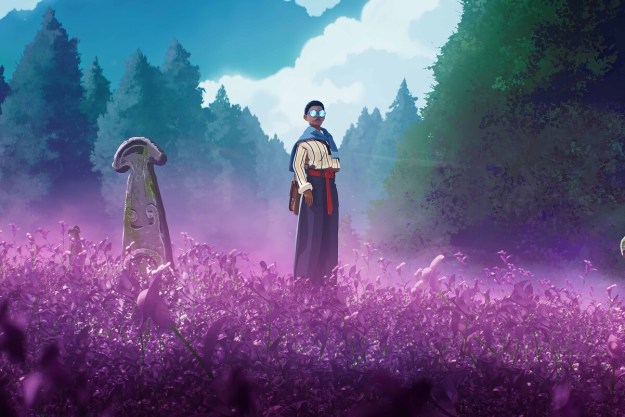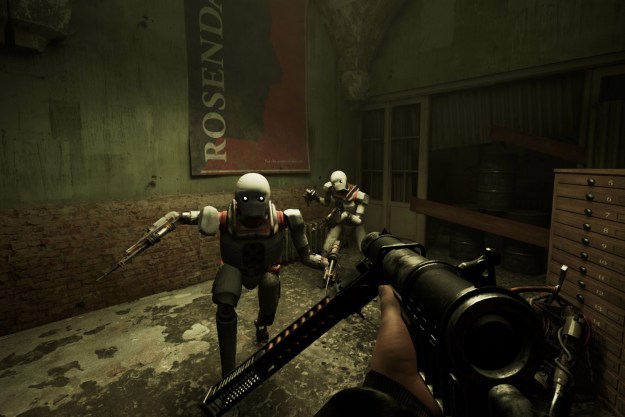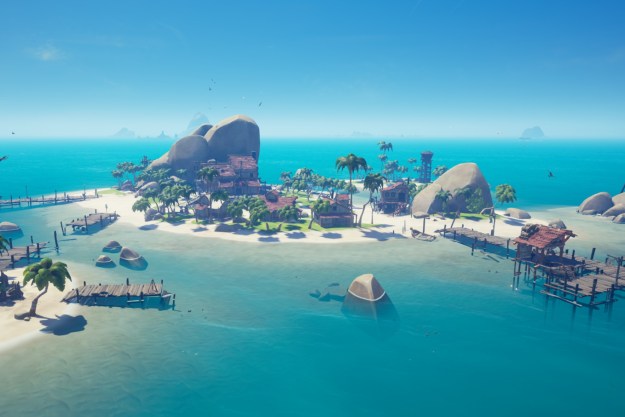
“SEASON: a letter to the future is an unforgettable road trip adventure that invites players to soak in its serene world.”
- Strong worldbuilding
- Painterly visuals
- Rich soundscape
- Thoughtful gameplay hooks
- Satisfying bike traversal
- Some meandering writing
- Parts feel underexplored
I imagine that I’ll never forget the first time I rode my bicycle in Season: A Letter to the Future (stylized as SEASON: A letter to the future by developer Scavengers Studio). Shortly into my first journey outside the walls of my secluded village, I find a bright pink bike beckoning me to ride it. I gingerly walk it through the town’s gates and then hop onto it and take off. I’m suddenly gliding down a hillside like a bird on the wind, soaking in the picturesque landscape outside of my hometown for the first time.
It’s not that I can recall every moment of the scene beat for beat. Rather, the broad strokes of it remain etched in my mind like a sketchbook doodle. I can hear the gentle sound of my bike tires spinning, imagine the splashes of cool colors, and feel the smooth motion of my bike careening through the countryside. If you stopped playing the game there, you could still understand everything it communicates to you throughout its six-hour adventure.
Season: A Letter to the Future is a meditative indie adventure that rewards players who are willing to slow down and take it all in. Even when its written story wanders, its vibrant world and detailed sound design always speaks for itself.
Time of the season
Season: A Letter to the Future joins a small list of games that I’d describe as “road trip stories.” It follows a young woman who’s tasked with leaving her isolated hillside village to alert the world of an impending season change. That may sound like a low-stakes setup, but seasons in this universe don’t just signal a few months of cold weather. The word marks a major sea change in the world, almost operating like a prophecy. One previous season, for instance, brought a war, the remnants of which still linger through its landscapes.
I’m not there to judge, but to listen and understand.
While it looks like a grounded slice-of-life tale initially, its tone more veers into quiet magical realism. Developer Scavengers Studio excels at crafting its own intriguing reality that blends naturalism with sincere spirituality. One moment ,I’m serenely strolling through a field of cows, basking in the sun’s golden glow. The next, I’m praying at the altar of a God that will wipe away a bit of my memory. No matter what discovery I make on my journey, I’m easily able to accept it as the natural order of the world. I’m not there to judge, but to listen and understand.
A large bulk of the six-hour game takes place in a small open-ended area where players are free to bike around and discover what happened in previous seasons through subtle environmental storytelling. It’s borderline postapocalyptic, but in a way that feels oddly soft and comforting. Abandoned cars line the streets, which the protagonist excitedly observes like ancient relics from a previous, tech-oriented season. It’s not that humanity is gone; it’s that it’s always in flux. It’s up to players to seek out answers about the old ways by filling up a journal that’ll act as a lasting record of history.

That setup makes for an engrossing collection of minor mysteries that I can either work to piece together or simply accept and move on. Sometimes, I’m even more satisfied not knowing. Season’s only real flaw is that it has the tendency to overthink itself, with its protagonist offering meandering philosophical waxing as she explores. Some of its writing vaguely meanders around a wide array of themes, cluttering an otherwise clear meditation on memory. Scavengers Studio almost seems self-aware of itself too. When I record a bird’s song near the end of the game, the protagonist starts to weave a wandering poem before admitting she has no idea where she’s going with the thought and abandoning it.
There are moments where the project can feel a bit limited in scope. After five hours, I wished there was more history and mystery for me to uncover. There are only a small handful of characters scattered around too, which left me with only a partial view of what this world’s inhabitants are actually like. Though there’s power in its limitations too. I desperately wanted to cling on and keep learning, but time waits for no one. It is not my job to stop the impending season, only to take as many memories as I can with me before I must move on.
Stop and listen
Season keeps its gameplay simple, taking a “walking simulator” approach, but the little choices it does make are meaningful. It’s ultimately a story about being present in the world and learning about it through osmosis. Every sight and sound is just as important as a hidden piece of lore that explicitly details the history of a mysterious military operation. That idea is reflected both in its painterly countryside vistas and its rich soundscape, full of rushing water and clicking cicadas.
When my journey ends, I have more to show for my time than a few Steam trophies.
Each of its few systems is thoughtfully considered to pair with those strengths. While gameplay is a little free-form, the main through line revolves around a scrapbook that can be filled out throughout the journey. The protagonist only leaves home with a camera and a field recorder, looking to document as much of the world as possible. Photography is especially rewarding, as the world isn’t littered with button prompts that show players what objects they can interact with. Instead, flavor text is generally triggered by taking a photo of something. The more I snap, the more my curiosity is rewarded when I’m least expecting it.
The audio recording aspect is an especially perfect match for its premise. When I hear a soothing sound, I can pull out my microphone and capture it for as long as I want. I spend minutes on end simply listening to bird calls or the sound of a fountain pouring out a gentle stream. I feel like I’m learning from the world, every little sound speaking to me. The narrative pushes on that idea more explicitly, as there are purple flowers scattered around that have absorbed conversations, turning them into natural audio logs.

Those meaningful interactions are linked together by one of the most satisfying traversal systems I’ve played in recent memory, up there with Sable‘s calm gliding. At any point, I can hop onto my bicycle and smoothly pedal my way around. I feel an immense sense of freedom in those moments; I’m practically able to feel the wind moving through my hair as the sound of the breeze blowing passes through me. Every moment I spend soaking it in is a blessing I can’t take for granted. Who knows if I’ll experience that peace again when the next season begins? I have to soak in the moment like those purple flowers.
When my journey ends, I have more to show for my time than a few Steam trophies. My journal acts as a record of where I’ve been, keeping the memory of my individual journey preserved. Every photo I’ve taken or sound I’ve recorded is kept in its pages, showing off the exact way I heard and saw the world in my travels. It’s a personal reward, and there’s quiet comfort in the fact that no one else’s final scrapbook will look exactly the same as mine. I filled my pages with the awe-inspiring landscapes that spoke to me, but perhaps someone else will focus their camera lens on the world’s urban decay to emphasize history’s haunting past. Neither perspective is wrong, and that’s something I learned to embrace by the time the credits rolled.
Season: A Letter to the Future was reviewed on PC.
Editors' Recommendations
- Sony forms PlayStation Mobile Division alongside Savage Game Studios acquisition
- The best PS4 hidden gems
- Sony considers game studio purchases for the PS5, but who should it target?





